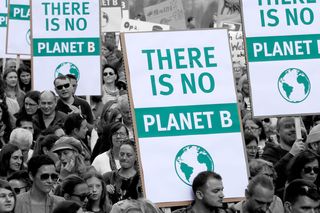
All the Arguments You Need: To Convince People That Individual Behavior Does Affect Climate Change
People cannot wash their hands of individual accountability just because governments and corporations aren’t doing what they should.

In our All The Arguments You Need series, we take on mindsets standing in the way of progress and rebut them with facts and logic.
Climate change-related destruction is inevitable; governments will always be evil; corporations will always be greedy; one person can barely make an impact; why bother doing anything at all — sound familiar? It’s the defeatist line of thought that our brains often creep toward each time the news cycle reports more damning climate change after-effects.
Sure, corporations and unsympathetic governments with the potential to inflict large-scale change will always be the root cause of the Earth’s climate degradation, but that is no excuse to wash hands of any potential beneficial effect one can have at any scale. If climate change is influenced by social change, then it is also influenced by individual behavior as multiples of singular people make up a group. Here are the arguments you need to convince people that one individual’s environmentally conscious behavior can make a difference.
“Switching off my A/C won’t save the planet.”
Why are we so obsessed with ‘saving the planet’ anyway? The planet is perfectly fine — we’ve just made sure it’s rapidly changing environment will make human life unsustainable. The core of why we fear climate change is that comfortable lives and human legacies– something we take for granted — will die out. Using negligible individual impact as an excuse for behaviors that do add up to large-scale effects showcases a lack of interest in the future of humanity and an attitude that doesn’t extend beyond self-comfort and self-preservation. Ignoring whatever impact one might have on the environment is perhaps the worst thing to have in common with large corporations and governments, or those who are responsible for the large-scale destruction of the planet as we know it.
Related on The Swaddle:
Little Big Things: A 23‑Year‑Old’s Dedication to Zero Waste
“How much difference can one person create at a planetary level?”
One girl skipped school to stand outside the Swedish Parliament to strike for the climate, and now nary a day passes when people aren’t talking about Fridays for Future. Each person who left their homes to go protest the destruction of Mumbai’s Aarey forest tree cover equally contributed to the reversal of the Maharastra government’s decision to build a Metro shed there. Each person who hugged a tree during the Chipko movement put their individual lives in danger to protect kilometers of tree cover from being cut down. Sure, none of these people are likely to have a large-scale, significant effect on global climate change, but they did make an effort to make their immediate environments sustainable — which adds up on a global scale.
Perhaps taking a quicker shower won’t save enough water to shield human civilization from devastating droughts, but showing up as an individual to protest injustice meted out by governments and corporations might actually help stop further destruction, or at least help keep the conversation going. One person influencing change at a global level is rare, but an individual might be able to make a difference within a movement.
‘Individual impact’ is an excuse to show off a superior, eco-friendly lifestyles and consumption trends
A lifestyle is not chosen by the sole purpose of looking down upon others. There is inherent goodness in choosing to quit animal products, to cut down on consumption and to sincerely put in the effort to reduce the waste one produces. The purpose of presenting a lifestyle as attractive is to draw more eyeballs towards it — and if the lifestyle is inherently contributing to reducing environmental waste, then there is no inherent flaw to it beyond that it may not be to everyone’s taste or ability to achieve. It is still a smaller burden for the planet, creates less waste and works towards forming a moreliveable immediate environment than a lifestyle of excess wastage. While there is definitely a better way to market and advocate for eco-friendly lifestyles, there’s no harm in following them.
Related on The Swaddle:
Manufacturing New Clothes Will Always Harm the Environment
“What does it matter? We’re all dying anyway.”
Only, we’re not. Climate change won’t strike like a disaster movie that wipes out civilization. The human race is large and dispersed enough to live through climate change, and they will have a bird’s eye view of pandemics, floods, vicious storms and droughts, and overall misery unless there are significant policies put in place that actively combat climate degradation.
Existentialism and bravado in the face of the end of times have served as helpful coping mechanisms and causes no immediate harm. However, maybe living through the ‘end’ of the world as we know it might make us wish we’d done something to help, no matter how little the contribution.
Aditi Murti is a culture writer at The Swaddle. Previously, she worked as a freelance journalist focused on gender and cities. Find her on social media @aditimurti.
Related


What a Transgender‑Friendly Health Care System Would Look Like
